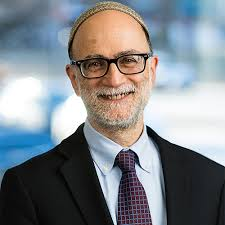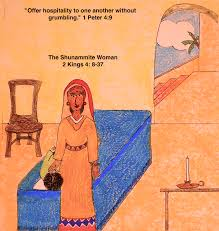 Dvar Torah Parashat vaYera 5782. Rav Dov Lerea Dvar Torah Parashat vaYera 5782. Rav Dov Lerea
October 22, 2021 * 16 Cheshvan 5782 * Haftorah: II Kings 4:1-37 The Spiritual Authenticity of Doubt and Disappointment
The haftorah comprises two stories from the prophetic career of Elisha‘, Eliyahu’s disciple. Particularly the second episode, the story of the Shunamite woman, teaches lessons about hope and resilience, and forms a tapestry of narrative motifs woven together from events in Avraham’s life. Listen to the echoes from the Avraham narratives. In the story, Elisha‘ travels regularly through Shunem. Elisha‘’s disciple, Geḥazi, is called a na‘ar, just like Avraham’s servants during the ‘aqeda. Yitsḥaq himself is also called a na’ar during that fateful event. The woman prepared an upper chamber for Elisha‘ during his travels, just as Avraham prepared his tent and sat outside, searching for wayfarers to bring home and feed. The mysterious messenger-wayfarers who approach Avraham and Sara’s tent were suddenly transposed into God speaking directly to Avraham, promising that Sara would bear a child. Geḥazi, in the haftorah, tells Elisha‘ that the woman is childless. He describes the couple's circumstances almost word for word with phrases used to describe Avraham and Sara: And he said, "Now what can we do for her? " And Geḥazi said, "Indeed, she has no son, and her husband is old." (II Kings 4:14) Elisha‘ promises that in a year hence, she will bear a child using the same phrase the messengers use promising Avraham offspring through Sara. There is also refusal to believe this prediction, just as both Sara and Avraham laughed (although only Sara is rebuked.) And he said, "At this time next year, when you will be alive like now, you will be embracing a son." And she said, "No, my lord, O man of God, do not deceive your maidservant." (II Kings 4:16) When the boy dies in his mothers lap and she then brings him up to Elisha‘’s chamber and lays her son on the bed, one imagines Yitsḥaq lying on the altar about to be slaughtered. The impact and role of the mothers is emphasized in both narratives. Regarding Sara, the rabbis taught that Sara died immediately following the ‘akeda, traumatized by the unfolding of the events: The narrative of the death of Sara follows immediately on that of the Binding of Yitsḥaq, because through the announcement of the Binding — that her son had been made ready for sacrifice and had almost been sacrificed — she received a great shock (literally, her soul flew from her) and she died (see, Rashi Bereshit 23:2 & Pirke d’Rabbi Eliezer 32) In the Elisha‘ narrative, the Shunamite woman becomes Avraham. She saddles her ass, just as Avraham had early in the morning of the ‘akeda, and speaks to her “girl-lad servant.” Instead of telling the servant to “wait here until I return,” as Avraham had, the Shunamite woman says, “Under no circumstances stop! Make certain we keep riding until our destination:” And she saddled the she-ass, and she said to her servant, "Drive and go forward. Don't keep back from riding because of me unless I tell you." (II Kings 4:24) As she approached Elisha‘ and Geḥazi, the text says that Elisha‘ looked and “saw her from a distance,” echoing the phrase in the binding of Yitsḥaq as Avraham approached Mt. Moria. ”Avraham lifted his eyes and saw the place from afar.” (Bereshit 22) Avraham and Yitsḥaq traveled to God’s chosen place, Har haMoria (identified in other sources as Har haBayit, the location of the Temple of Jerusalem, as well as of Gan Eden). Here, the woman finds Elisha‘ also at a mountain, Har haKarmel, which also means, “the garden of the mountain.” At the moment of encounter, the Shunamite becomes Hannah, embittered and traumatized by tragedy. Just as Hannah | cried out to God and described herself as “bitter of soul” (I Samuel 1), Elisha‘ recognizes the same quality now in the Shunamite: And she came to the man of God to the mountain, and she took hold of his feet; and Geḥazi approached to push her away. Now the man of God said, "Let her be, for her soul is bitter to her, and the Lord hid it from me and did not tell me." (II Kings 4:27) This last phrase also echoes a moment from the parasha. God said aloud, “Shall I ide from Avraha what I am about to do [to Sdom and ‘Amora?” Whereas here, Elisha‘ recognizes that God hid the child’s death from the prophet, leaving it to the Shunamite woman to inform him of the tragic turn of events. Geḥazi and Elisha‘ travel to the boy. The boy is dead, lying on the bed of the prophet, as if it were an altar. Geḥazi checks for breathing with his staff. Elisha‘ lies on the boy’s body, mouth to mouth, hand to hand, eye to eye The prophet paces the room. He lay on the young boy again, and the boy, according to Rashi and others, “sneezed” seven times. The verb, yezorer, is unusual, but it clearly has to do with breath. The boy returned to life by breathing, and then opening his eyes. This is a tale of hope, perseverance, resilience, and faith. In some ways, the Shunamite woman is a spiritual isotope of Avraham Avinu. They both respond to circumstances with alacrity. Both respond to God’s word; Avraham directly, and the Shunamite to the word of God’s prophet. Both saddle an ass. Both have servants accompanying them. Both narratives entail a sacred mountain and vision from a distance. However, Avraham focuses on God; the Shunamite focuses on her son. Avraham is silent; the Shunamite is active and direct. Avraham is compliant and accepting of whatever might be the outcome, the Shunamite struggles with the tension between hope and reality. She fell on Elisha‘'s feet and said, “Did I not say to you, ‘Do not mislead me?!”’ (II Kings 4:28) The word for “mislead” is “tashle.” Commentators as well as the Targum Yonatan take this word to mean, do not set me up for disappointment. In other words, Do not grant me a son, if he will be met with an untimely and tragic end. The Shunamite has the courage, the resilience, and the inner strength to articulate and express the tensions at the heart of hope and faith. There is no authentic faith, she teaches us, without doubts and disappointments. Avraham felt this intuitively. But if we read the Tanakh as the developmental stages in the sacred history of our people, the Shunamite woman grants us permission to nourish our hopes for the future and our trust in God as a loving and supportive Creator by working through our doubts, challenges, questions and uncertainties. Perhaps the narrative teaches us that we can cultivate a deep, holistic faith only by acknowledging and engaging the spiritual struggles life brings us along the way.
Shabbat Shalom, Rabbi Dov
Support Beth Aharon | Thank you for being part of the Beth Aharon community. Please keep on supporting us in tefilot, events, membership and donations. High Holidays Seats & Pledges, Membership Dues & Other Contributions, may be donated online at www.bethaharon.org or be mailed to: Congregation Beth Aharon/HIR, 3700 Henry  Hudson Parkway, Bronx, NY 10463. Hudson Parkway, Bronx, NY 10463. Contact us via email at bethaharon@gmail.com for general inquiries and to join our email listing. Tizku Leshanim Rabot V’tovot!. |
This Week’s BAN is Sponsored By |
SHOSHANA M. SCHWARTZ, ESQ.
* REAL ESTATE * WILLS * PERSONAL INJURY * SMALL BUSINESS L. STEPHEN SAVITT, P.C. 475 PARK AVE. SOUTH 18th FL. NEW YORK, NY 10016 TEL: 212.398.4300 RIVERDALE: 718.796.2034 |
|